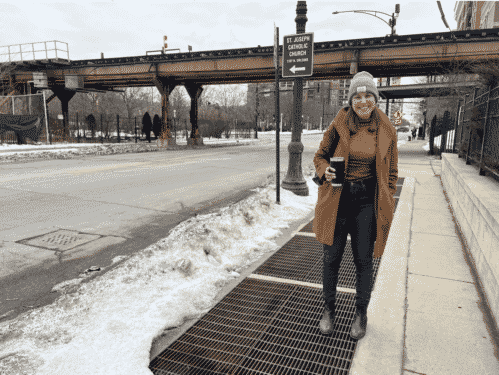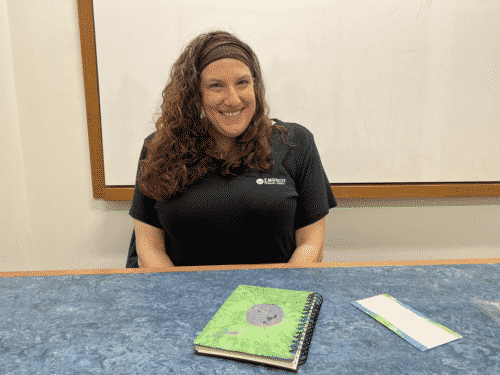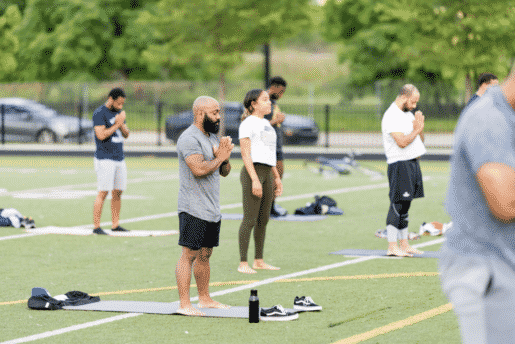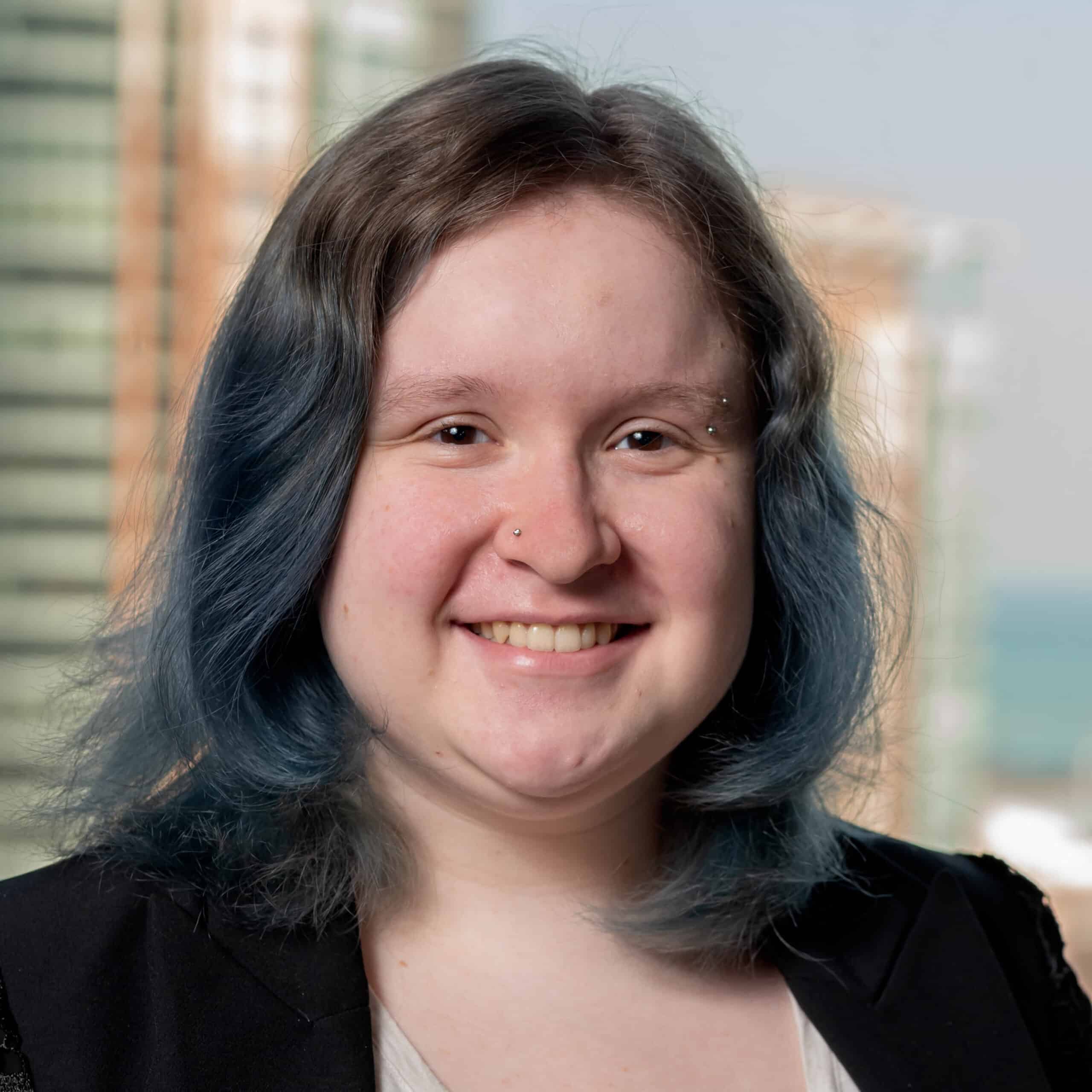4 organizations offer unexpected, active approaches to mental health therapy in Chicago
Sometimes a single experience can change everything, shifting your perspective and opening your mind to possibilities. And many in Chicago are seeking such experiences.
From the pandemic to economic uncertainty, climate change to societal unrest, plenty of factors have fueled anxiety, depression, and grief in recent years. In fact, anxiety and depression jumped by 25% worldwide during the pandemic’s first year, the World Health Organization reported in March.
Chicagoans were no exception. An estimated one in 10 adult Chicago residents experienced serious psychological distress in 2020, and about 32% took advantage of behavioral and mental health treatment, according to the Chicago Health Atlas.
But not everyone here has access to conventional mental health treatments. Instead, local organizations are tackling mental health issues through nontraditional approaches, such as outdoor sports, improv, yoga, and theater, providing unique spaces to connect and to heal.
And while mental health has taken a more prominent place in the national conversation in recent years, a societal reluctance to talk openly about mental health issues remains.
“No one’s like, ‘Hey, on Tuesday over dinner, you want to talk about schizophrenia?’ Nobody dedicates that time,” says Heather Bodie, executive artistic director of Erasing the Distance, a nonprofit theater company that documents mental health stories and shares them on stage. “So that’s why we exist, to dedicate time to conversation.”
Diverse therapy options have the potential to reach unexpected people in unexpected ways. These four Chicago organizations are moving mental health discussions beyond the therapy couch, tackling stigma and creating healing spaces through nontraditional therapeutic approaches.
Urban wilderness therapy
Zorbari Nwidor was 17 years old when she saw stars for the first time. She’d been camping with Chicago Adventure Therapy in 2012.
“You don’t see stars in Chicago. You see airplanes and things, and I think that was a really changing moment in my life, to be out in nature, to look up into the sky and be like, ‘Wow, I lived for this long, and I’ve never seen stars,’” she says.
The experience opened Nwidor’s world. Two years later, she became a Chicago Adventure Therapy intern. Today, she is senior program staff at the organization.
Since 2007, Chicago Adventure Therapy has promoted mental health, social skills, and personal responsibility through outdoor activities such as paddling, camping, cycling, and rock climbing.
The organization prioritizes diversity and inclusion, and most participants are young people of color between 13 and 17 years old — a group traditionally underrepresented in outdoor activities. Chicago Adventure Therapy has worked with a range of young people — including individuals in need of mental health support, refugees, gang members, and youth experiencing homelessness. In 2021, the program served more than 750 people.
Adventurers never have to pay. Chicago Adventure Therapy’s funding primarily comes through individual donations and from partner agencies and schools, which bring in the majority of the organization’s participants.
Laura Statesir, director of operations at Chicago Adventure Therapy, remembers one young Chicago resident with a family legacy of gang involvement whose perspective changed after he went on a Chicago Adventure Therapy trip. Now, he’s in college.
“Just by going on this trip where everything we were doing was different — paddling, camping, and seeing stars — he began to think that maybe there was something slightly different out there than the outcomes he thought were predetermined for his life,” Statesir says.
Mental health through documentary theater

Erasing the Distance performances create self-compassion as participants witness each other’s stories and see their own stories reflected back.
Following the performances, the audience often stays after to chat with the cast, further exploring the issues, says Heather Bodie, executive artistic director. Audience members share their own experiences and reactions, exploring difficult mental health topics such as grief and loss or men’s mental health.
“I’ll never forget [what] this one person said to me after a show,” Bodie says. The person confessed that they just wanted to listen, not talk about their own story. But after the performance they said, “I’m gonna go find a therapist.”
Erasing the Distance uses the power of storytelling to broach difficult topics. Staff members conduct 60- to 90-minute interviews with people who volunteer to share their personal stories involving mental health struggles. The staff then shape the interviews into 10-minute monologues that professional actors perform.
“It was an exercise in freedom,” says Melanie Thompson, now an associate at Erasing the Distance, of her own storytelling experience. “To see someone show me so much compassion, in even just telling my story, it moved me. I felt so grateful to have shared and so grateful to the actor.”
Bodie says many storytellers have told her that hearing their story increased their self-compassion. “Yes, there are tears, but there’s tons of laughter, too. There is pain, but there’s also tons of joy and exploration and discovery. It is so cool to hear what somebody else is living with and how they’re managing it,” she says.
To date, the Chicago-based nonprofit has collected more than 300 stories and performed at venues throughout the Chicago area and all over the country.
Erasing the Distance’s public productions are free, but custom programs and workshops have a cost. The staff continuously collects mental health accounts and has released a podcast with the stories, available on Spotify.
Improv comedy as therapy

Sometimes, theater and therapy aren’t all that far apart.
“When I was doing my own therapy and doing my own work on myself, I realized that my improv teacher and my therapist were telling me the same things,” says Angela Nino, founder and CEO of Improv Therapy Group.
Nino found it easier to explore emotions in the safe environment of improv. So she texted her teacher about starting an improv comedy and therapy program. When her teacher responded with a thumbs up, Nino launched Improv Therapy Group to use improv to help people face mental health challenges in unexpected and dynamic ways.
The group works primarily with therapists, who then employ improv games with their clients. Improv Therapy Group also offers sessions for clergy and corrections officers, and it is developing a module for law enforcement. Participants come from the Chicago area and beyond, including some who have joined from New Zealand and the U.K. over Zoom.
Improv uses a “yes and” technique that is helpful in other areas of life, Nino says. Saying “yes and” instead of “no” requires people to build upon another’s words — and worlds — ultimately expanding their own.
Creating stillness through yoga

The power and peace of yoga can promote healing. But for some populations, yoga isn’t always a go-to option.
In the summer of 2020, the U.S. was in turmoil with the pandemic and civil unrest. Andrew Smith and Tristan Lewis felt emotionally heavy, as did many of the Black men they spoke to.
To help process the year’s traumas, Smith and Lewis organized a yoga session at 6 a.m. on a Sunday in June, in a South Loop park. Ten men RSVP’d yes; more than 20 showed up.
“It dawned on me that a lot of guys had never stepped foot in a yoga studio before,” says Lewis, co-founder of The Healing, a Chicago organization that uses yoga to strengthen Brown and Black men’s mental health. He adds that Black men typically don’t frequent yoga studios because, due to the lack of representation in the space, many don’t feel completely comfortable.
“It was something that we benefited from highly, from a mental aspect,” Lewis says, of the first yoga session. “It was also comical because we were all trying to do these yoga poses, but we didn’t know what we were doing.”
The nonprofit temporarily moved its free monthly yoga sessions online due to the pandemic, but Lewis and his colleagues recently brought back in-person sessions.
“Yoga can help promote mental health healing, just by getting us all to be still,” Lewis says. “The power of stillness is unmatched.” The Healing also leads community outreach sessions and has a dedicated group chat for members.

Yuliya Klochan is pursuing a master’s degree in journalism with a specialization in health, science, and environment reporting at Northwestern University’s Medill School of Journalism.












